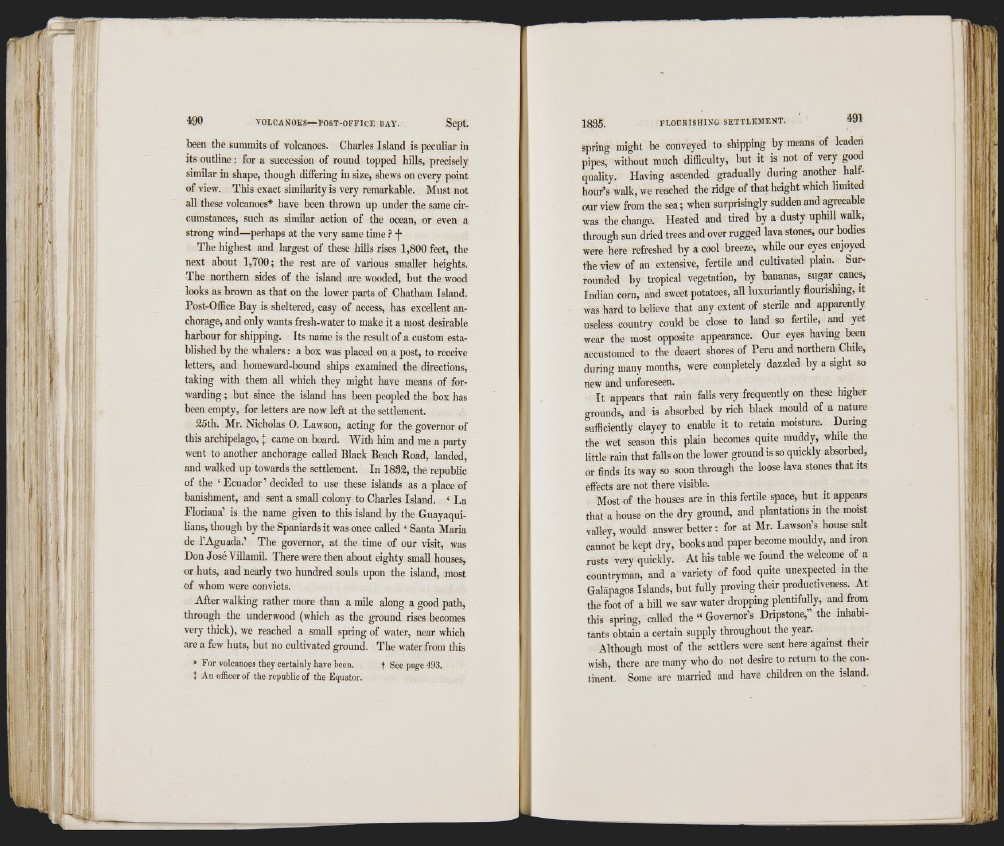
j, ,í Mt'
P ':il s Aiii .n: .i■
‘ 'iM
! H
been the summits of volcanoes. Charles Island is peculiar in
its outline : for a succession of round topped hills, precisely
similar in shape, though differing in size, shews on every point
of view. This exact similarity is very remarkable. Must not
all these volcanoes* have been thrown up under the same circumstances,
such as similar action of the ocean, or even a
strong wind—perhaps at the very same time ? f
The highest and largest of these hills rises 1,800 feet, the
next about 1,700 ; the rest are of various smaller heights.
The northern sides of the island are wooded, but the wood
looks as brown as that on the lower parts of Chatham Island.
Post-Office Bay is sheltered, easy of access, has excellent anchorage,
and only wants fresh-water to make it a most desirable
harbour for shipping. Its name is the result of a custom established
by the whalers : a box was placed on a post, to receive
letters, and homeward-bound ships examined the directions,
taking with them all which they might have means of forwarding
; but since the island has been peopled the box has
been empty, for letters are now left at the settlement.
SSth. Mr. Nicholas O. Lawson, acting for the governor of
this archipelago, j came on board. With him and me a party
went to another anchorage called Black Beach Road, landed,
and walked up towards the settlement. In 1882, the republic
of the ‘ Lcuador ’ decided to use these islands as a place of
banishment, and sent a small colony to Charles Island. ‘ La
Floriana’ is the name given to this island by the Guayaqui-
lians, though by the Spaniards it was once called ‘ Santa Maria
de TAguada.’ The governor, at the time of our visit, was
Don José Villamil. There were then about eighty small houses,
or huts, and nearly two hundred souls upon the island, most
of whom were convicts.
After walking rather more than a mile along a good path,
through the underwood (which as the ground rises becomes
very thick), we reached a small spring of water, near which
are a few huts, but no cultivated ground. The water from this
• For volcanoes they certainly have been. f See page 493.
Î An officer of the republic of the Equator.
spring might be conveyed to shipping by means of leaden
pipes, without much difficulty, but it is not of very goo
quality. Having ascended gradually during another half-
hour’s walk, we reached the ridge of that height which limited
our view from the sea; when surprisingly sudden and agreeable
was the change Heated and tired by a dusty uphill walk,
through sun dried trees and over rugged lava stones, our bodies
were here refreshed by a cool breeze, while our eyes enjoyed
the view of an extensive, fertile and cultivated plain. Surrounded
by tropical vegetation, by bananas, sugar canes,
Indian corn, and s w e e t potatoes, all luxuriantly flourishing, it
was hard to believe that any extent of sterile and apparently
useless country could be close to land so fertile, and yet
wear the most opposite appearance. Our eyes having bren
accustomed to the desert shores of Peru and northern Chile,
during many months, were completely dazzled by a sight so
new and unforeseen.
I t appears that rain falls very frequently on these higher
trrounds, and is absorbed by rich black mould of a nature
sufficiently clayey to enable it to retain moisture. During
the wet season this plain becomes quite muddy, while the
little rain that falls on the lower ground is so quickly absorbed,
or finds its way so soon through the loose lava stones that its
effects are not there visible.
Most of the houses are in this fertile space, but it appears
that a house on the dry ground, and plantations in the moist
valley, would answer better: for at Mr. Lawson’s house salt
cannot be kept dry, books and paper become mouldy, and iron
rusts very quickly. At his table we found the welcome of a
countryman, and a variety of food quite unexpected in the
Galapagos Islands, but fully proving their productiveness. At
the foot of a hill we saw water dropping plentifully, and from
this spring, called the “ Governor’s Dripstone,” the inhabitants
obtain a certain supply throughout the year.
Although most of the settlers were sent here against their
wish, there are many who do not desire to return to the continent.
Some are married and have children on the island.
I ll
I
lid ’
,s